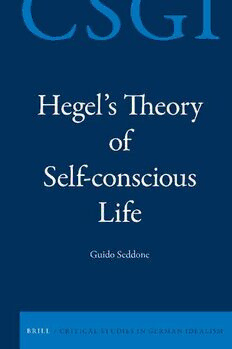
Hegel's Theory of Self-Conscious Life (Critical Studies in German Idealism) PDF
Preview Hegel's Theory of Self-Conscious Life (Critical Studies in German Idealism)
Hegel’s Theory of Self- conscious Life Critical Studies in German Idealism Series Editor Paul G. Cobben Advisory Board Simon Critchley – Paul Cruysberghs – Rózsa Erzsébet – Garth Green Vittorio Hösle – Francesca Menegoni – Martin Moors – Michael Quante Ludwig Siep – Timo Slootweg – Klaus Vieweg volume 30 The titles published in this series are listed at brill.com/csgi Hegel’s Theory of Self- conscious Life By Guido Seddone LEIDEN | BOSTON The Library of Congress Cataloging- in- Publication Data is available online at https://cata log.loc.gov lc record available at https://lccn.loc.gov/2022042160 Typeface for the Latin, Greek, and Cyrillic scripts: “Brill”. See and download: brill.com/b rill- typeface. issn 1878-9 986 isbn 978-9 0-0 4-5 2602-0 (hardback) isbn 978-9 0-0 4-5 2763-8 (e- book) Copyright 2023 by Guido Seddone. Published by Koninklijke Brill nv, Leiden, The Netherlands. Koninklijke Brill nv incorporates the imprints Brill, Brill Nijhoff, Brill Hotei, Brill Schöningh, Brill Fink, Brill mentis, Vandenhoeck & Ruprecht, Böhlau, V&R unipress and Wageningen Academic. Koninklijke Brill nv reserves the right to protect this publication against unauthorized use. Requests for re-use and/ or translations must be addressed to Koninklijke Brill nv via brill.com or copyright.com. This book is printed on acid- free paper and produced in a sustainable manner. The task of proving and explaining in more detail this innermost insight of speculation— that is infinity as self- referring negativity, this ultimate source of all activity, life, and consciousness— belongs to logic as purely speculative philosophy g. w. f. hegel, Philosophy of Right § 7 ∵ Contents A cknowledgements ix I ntroduction 1 1 S cience of Logic: The Logical Premises of Hegel’s Naturalism 9 2 S elf- consciousness 39 3 T he Hegelian Theory about the (Human) Biological Organism 62 4 E xtended and Embodied Mind 78 5 N atural and Self- conscious Agency 93 6 N ormativity and Freedom 116 7 N aturalizing World Human History: Hegel’s Philosophy of History 131 R eferences and Abbreviations 151 I ndex 154 newgenprepdf Acknowledgements Hegel’s thought represents a huge challenge for every philosopher because it fosters the power of abstraction and conceptualization and pushes the lim- its of language to attain an extensive understanding of human rationality, sociality and history. This book acquiesces in following the path indicated by Hegel and aims at enhancing our comprehension of the classical philosoph- ical problems from the contemporary point of view. This is the reason why I am indebted to a large group of people for helping me in various ways to develop the ideas in the book and get them on paper. Firstly, I would like to mention the Research European Agency of the European Commission for financing this project under the Marie Sklodowska- Curie grant agreement No. 704127, hegnat. Many thanks go to the Department dusic of the University of Parma where the project hegnat has been hosted and carried out from 2016– 2019 and where I am currently associate professor for theoretical phi- losophy. The support from the Director Prof. D. Saglia, the faculty members and the administrative staff has been of utmost importance for obtaining the serenity necessary to carry on this philosophical endeavor. Many thanks also to the Department of Philosophy, Georgetown University (Washington D.C.) for hosting me two years as a Visiting Fellow from 2016– 2018. I express also my gratitude to the Department of Philosophy, unsw (Sydney, au) for the co- organization of the conference Naturalism and Sociality in February 2019. Finally, I would like to acknowledge my indebtedness to relevant colleagues and academics for their competent support, supervision and criticism. Terry Pinkard has been crucial in supporting me and supervising my project on Hegel’s naturalism during my stay at Georgetown University; his expertise in this field has been fundamental for improving my knowledge about this argument. Of course, my research has benefited by the feedback from many influent colleagues, among them I would like to remember those who mostly inspired my work: Karen Ng, Rocío Zambrana, Sebastian Rödl, Pirmin Stekeler- Weithofer, Christopher Yeomans, Robert Pippin, Thomas Khurana, Matthias Haase, Heikki Ikäheimo. Concerning the literature quoted in this book, I would like to inform the reader about my choice to only use the English translation of the Hegel’s works because my aim has been to address theoretical and systematic aspects of the Hegelian philosophy and to avoid any methodology recalling history of phi- losophy and its nuances. For me the central issue is relating Hegel’s thought to contemporary issues and not to past ones. I decided to abbreviate the titles of these books, the reader will find the list of the abbreviations at the end of this volume under the heading References and Abbreviations.
